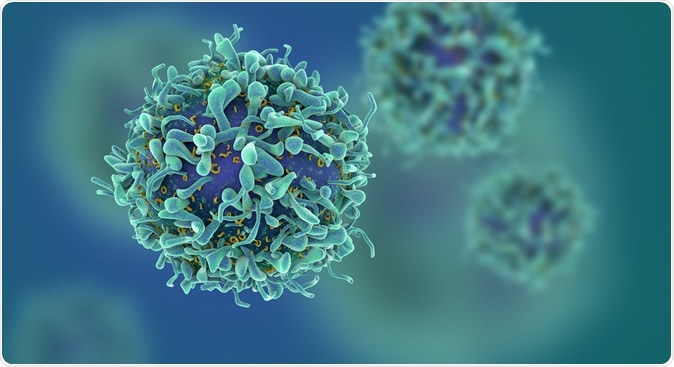
3D illustration of T cells or cancer cells. Image Credit: Fusebulb / Shutterstock
HIV has become a worldwide epidemic with almost 38 million people living with the disease all over the world. About 20% of these are unaware of their status and are not on treatment.
Of the rest, antiretroviral therapy is the mainstay of HIV treatment. this regime is very effective at controlling the infection, reducing the viral load to undetectable and non-transmissible levels in the blood and other body tissues. However, it has to be continued lifelong because the virus hides in certain tissues in a dormant state, showing no sign of activity at all until the medication is stopped. At this point, typically, the patient shows almost immediate signs of a flare-up of viral activity.
Recent research has shown the potential usefulness of an alternative to chemotherapy, by the use of immunotherapy where two antibodies designed to neutralize the virus are used to inhibit viral activity. Antibodies are not like drugs in that they not only inhibit the virus by latching on to certain key sites and preventing its normal activity, but also signal the immune system and activate it agains the intruders.
Humoral and cellular immunity
Traditionally, human immunity has been viewed in terms of non-adaptive and adaptive immunity. The first is also called innate immunity, and is set into action by the stimulus of any foreign protein. It is mediated by non-specific immune cells like the white blood cells called phagocytes (neutrophils and macrophages), and depends on the engulfing of the unrecognized or ‘stranger’ particles or cells by the immune cells. At the same time, the foreign antigens are ‘presented’ to the patrolling adaptive or specific immune cells to be recognized and their memory archived. This helps the body to mount an immune response directed specifically against any particle bearing this particular antigen in the future, and to do it much faster than the first time.
The adaptive immune system consists of two parts, the humoral and the cell-mediated. Humoral or antibody-mediated immunity is carried out by the B lymphocytes, which are also part of the white blood cell community. These cells respond to circulating antigens. As the foreign antigen meets the B-lymphocyte, the latter is activated to change into a so-called plasma cell, which is in effect a factory to churn out specific antibodies. Some of these also become memory cells that carry the antigenic imprint for life, to quickly re-establish antibody production should the antigen ever appear in the body again. The antibodies produced by plasma cells bind rapidly to the antigens to do one of three things: ‘neutralize’ them, that is, prevent their binding to host cells to bring about specific target actions; kill the cell bearing the foreign antigen and thus contain the infection; or mark the infected cell for engulfment and destruction by phagocytes.
The cell-mediated immunity arm deals with antigens inside the infected cells, and occurs primarily via T cells. The infected cell has the foreign antigens present on its surface or on an antigen-presenting cell. These antigens activate helper T lymphocytes to secrete cytokines, chemicals that stimulate activated T cells to bind to the antigens on the infected cell. This triggers the differentiation of the T cell into a cytotoxic T cell that is devoted to killing the infected cell.
The study
The current study looked at the effects of antibody treatment on the immune system of the host.
The researchers examined blood samples taken from participants in a phase 1b clinical trial based on the use of monoclonal antibodies produced in a laboratory. In a phase 1 trial, the new drug or treatment is tested for its safety in humans at varying doses and determine the maximum safe dose.
All the participants had been on ART. At one point, nine of them, in whom the viruses showed sensitivity to antibodies, were put on immunotherapy in the form of an injection of a dual-antibody cocktail. 2 days later, the ART was stopped.
The injections were repeated at 3 and 6 weeks. Blood tests for viral activity were repeated every week.
The researchers looked at the influence on other immune cells that are involved in antiviral activity, using advanced techniques to discriminate the type of cell that was being observed.
The findings
The researchers found that following the injection of neutralizing antibodies, and without ART, there was a marked increase in the level of CD4 and CD8 T cell responses directed specifically against the virus. This type of interaction could indicate the presence of a hitherto unknown relationship between antibodies and cell-mediated immunity in the form of T cells activation.
After the completion of treatment, the patients continued to show no signs of viral activity for 15 weeks or more afterwards. This is a highly encouraging sign. However, the investigators need to see whether this increase in T cell response really means an improved immune response that controls HIV more effectively. This must be addressed through future experiments.
Calling the experiment a “proof-of-concept”, researcher Daniel E. Kaufmann says, “ In the future, this kind of antibody therapy will be studied in larger clinical trials for HIV prevention or treatment, as antibodies are very well tolerated by humans and can efficiently block the virus for many weeks.”
Journal reference:
Niessl, J., Baxter, A.E., Mendoza, P. et al. Combination anti-HIV-1 antibody therapy is associated with increased virus-specific T cell immunity. Nat Med (2020). https://doi.org/10.1038/s41591-019-0747-1